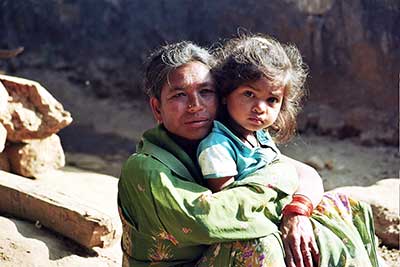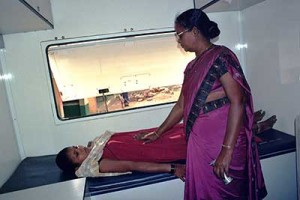 Axshya (meaning TB free), is a major nationwide TB initiative funded by the Global Fund to Fight AIDS, TB and Malaria, the leading global funder of TB programmes. TB Alert India carries out Axshya’s work in the states of Andhra Pradesh and Telangana, managing the project in seven districts.
Axshya (meaning TB free), is a major nationwide TB initiative funded by the Global Fund to Fight AIDS, TB and Malaria, the leading global funder of TB programmes. TB Alert India carries out Axshya’s work in the states of Andhra Pradesh and Telangana, managing the project in seven districts.
Reaching the under-served
 Axshya’s programmes aim to improve the rates of TB diagnosis and treatment for vulnerable people in under-served communities. These include women, children, tribal communities, urban slum dwellers and migrant populations – it is these groups who, in the past, have tended to miss out on vital TB care.
Axshya’s programmes aim to improve the rates of TB diagnosis and treatment for vulnerable people in under-served communities. These include women, children, tribal communities, urban slum dwellers and migrant populations – it is these groups who, in the past, have tended to miss out on vital TB care.
The project works at a grassroots level, providing training in TB to local NGOs, community volunteers and rural health care providers who are trusted by their communities. This means they develop the skills to identify symptoms of the disease, and can support people through diagnosis and treatment.
By holding local meetings to raise awareness of TB, and developing TB action plans, community members are investing in their own healthcare.
Tackling TB in the workplace
As TB can spread more easily in crowded environments, including certain workplaces, it makes sense to target these locations with TB messages. By working with the government’s Factories Department, TB Alert India has indentified 50 industries particularly vulnerable to TB, including stone crushers, cement workers, glass manufacturers and brick workers.
Project staff are now going into these workplaces to raise awareness about TB, and screen workers for symptoms of TB, referring on those who may have the illness for diagnosis and treatment.
 TB-HIV co-infection
TB-HIV co-infection
To ensure that people with TB-HIV co-infection get the best care possible, health care professionals need to consider both conditions together. It’s vital that people living with HIV are diagnosed and treated for TB as early as possible – without treatment they could die within mere weeks.
TB Alert India has been working with local government on improving cross referral of these two conditions, so if a person is diagnosed with one illness, they are then referred for diagnosis of the other. This means people with TB-HIV co-infection will receive the right treatment to allow them to recover from TB and stay as healthy as possible.
The project also involves raising awareness and providing training on TB among networks of people living with HIV, so they can recognise the signs of TB and seek life-saving treatment.
